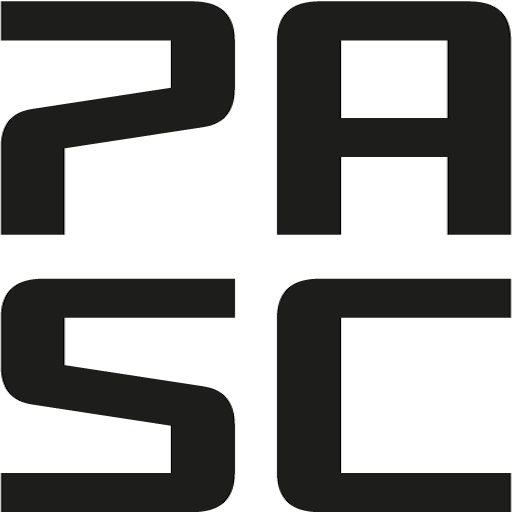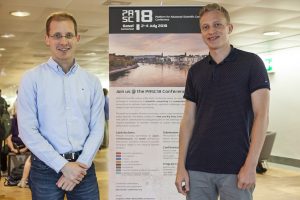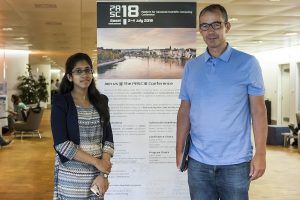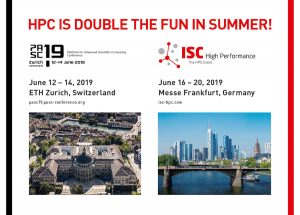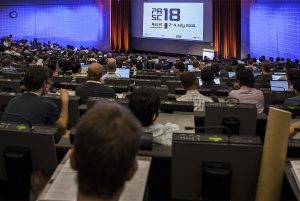 The PASC18 Organizing Team was delighted to welcome 400 attendees from 26 countries to Basel last week for the fifth edition of the PASC Conference series. Thanks to its participants – more than 50% from abroad – who brought a wide range of perspectives on computational science from a variety of scientific fields, PASC18 can be considered a truly international and interdisciplinary platform.
The PASC18 Organizing Team was delighted to welcome 400 attendees from 26 countries to Basel last week for the fifth edition of the PASC Conference series. Thanks to its participants – more than 50% from abroad – who brought a wide range of perspectives on computational science from a variety of scientific fields, PASC18 can be considered a truly international and interdisciplinary platform.
The technical program featured keynotes from Alice-Agnes Gabriel (Ludwig Maximilian University of Munich) onextreme-scale earthquake simulations, David Bader (GeorgiaTech) on massive-scale analytics in real-world problems, Nils Wedi (ECMWF) on kilometer-scale weather and climate simulations, and Marina Becoulet (CEA/IRFM) on first-principles modelling of magnetohydrodynamics in fusiondevices. Finally, charismatic VP and CTO of Hewlett Packard Enterprise Eng Lim Goh wowed the audience with his outlook on the paradigm shift from deductivereasoning to inductivereasoning, spurred by the application of artificial intelligence and machine-learning techniques to decades of accumulated data.Video recordings will be available within the next couple of weeks.
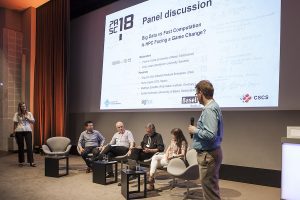 The theme of this year’s conference “Fast and Big Data, Fast and Big Computation” was discussed in a panel session, expertlymoderated by PASC18 ChairsFlorina Ciorba (University of Basel) and Erik Lindahl (Stockholm University). The panelists Nuria Lopez (Institute of Chemical Research of Catalonia), Matthias Scheffler (Fritz Haber Institute), Torsten Schwede (University of Basel), and Eng Lim Goh, engaged in a lively discussion on whether computational scientists need to apply techniques and algorithms from big data and artificial intelligence, or is it rather that the latter areas need to learn how to use and apply HPC to their own algorithms?
The theme of this year’s conference “Fast and Big Data, Fast and Big Computation” was discussed in a panel session, expertlymoderated by PASC18 ChairsFlorina Ciorba (University of Basel) and Erik Lindahl (Stockholm University). The panelists Nuria Lopez (Institute of Chemical Research of Catalonia), Matthias Scheffler (Fritz Haber Institute), Torsten Schwede (University of Basel), and Eng Lim Goh, engaged in a lively discussion on whether computational scientists need to apply techniques and algorithms from big data and artificial intelligence, or is it rather that the latter areas need to learn how to use and apply HPC to their own algorithms?
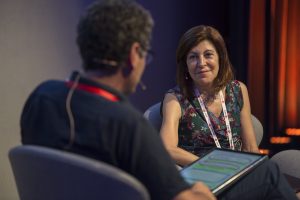 In line with the PASC Conference’s focus on multidisciplinary exchange, this year’s program included a novel session: an Interdisciplinary Dialogue. Petros Koumoutsakos, from ETH Zurich, engaged Constantia Alexandrou, from the University of Cyprus and The Cyprus Institute, in a “colourful” discussion on her area of research – quantum chromodynamics – and present-day scientific computing in general. A videorecording of the interdisciplinary dialogue is available here.
In line with the PASC Conference’s focus on multidisciplinary exchange, this year’s program included a novel session: an Interdisciplinary Dialogue. Petros Koumoutsakos, from ETH Zurich, engaged Constantia Alexandrou, from the University of Cyprus and The Cyprus Institute, in a “colourful” discussion on her area of research – quantum chromodynamics – and present-day scientific computing in general. A videorecording of the interdisciplinary dialogue is available here.
Notwithstanding the stimulating plenary sessions, the success of this year’s event was due primarily to the high quality of the minisymposium and paper sessions. Full papers are now available in the Proceedings of the PASC Conference, published in the ACM Digital Library at http://dl.acm.org/citation.cfm?id=3218176(see Table of Contents tab), while slide decks from the minisymposium sessions – and poster presentations – will soon be available on the PASC18 website.
We invite all presenters who have not already done so already to send their slides in pdf format to info@pasc-conference.org by July 15, 2018.
PASC18 on Social Media and Photo Gallery
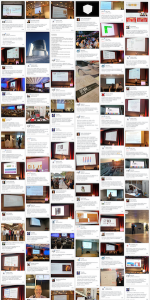 We would like to thank all the participants who shared their thoughts on the conference in real time via Twitter. We had more than 150 users tweeting with hashtag #PASC18 during the three days of the conference.
We would like to thank all the participants who shared their thoughts on the conference in real time via Twitter. We had more than 150 users tweeting with hashtag #PASC18 during the three days of the conference.
A photo gallery can be viewed here.
PASC18 Student Travel Grant Winners
We were delighted to be able to offer Student Travel Grants for the first time at PASC18, sponsored by ACM’s SIGHPC. Alongside funding to attend the conference, the grant recipients, Jens Florian Mailman (University of Valencia) and Sushma Yellapragada (The Northcap University), were assigned mentors to guide them during the conference and introduce them to experts in their research fields.
Dr. Simon Scheidegger (University of Zurich) with Jens Florian Mahlmann
Sushma Yellapragada with Prof. Olaf Schenk (Università della Svizzera italiana)
Some impressions from the Student Travel Grant recipients:
“The mentoring at PASC18 will follow me in my current and future work – being at my first big conference, personal exchanges about experiences and career choices, as well as introduction to scientists in my domain was invaluable. Also, these exchanges at PASC18 actively encouraged me to apply for test accounts on HPC resources in order to benchmark my own research and get ready for being part of this exciting community. I am looking forward to do so!”
Thank You to Our Sponsors and Event Partners
Thanks to our generous sponsors! We extend our sincere appreciation to our sponsors and event partners, without whom PASC18 would not have been possible.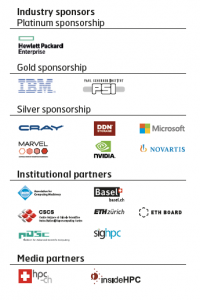
PASC19
PASC18 may have ended, but we are already beginning preparations for the next edition of the PASC Conference series. We hope to welcome you all to Zurich in June 2019 for more stimulating discussions around computational science and high-performance computing!
This message has been sponsored by NVIDIA, official Silver Sponsor of PASC18
NVIDIA’s invention of the GPU in 1999 redefined modern computer graphics and revolutionized parallel computing. In 2006, the creation of the CUDA programming model and Tesla GPU platform opened up the parallel-processing capabilities of the GPU to general-purpose computing, a powerful new approach to computing. GPU computing is the most pervasive, accessible, energy-efficient path forward for HPC and data centers – Learn more>>
